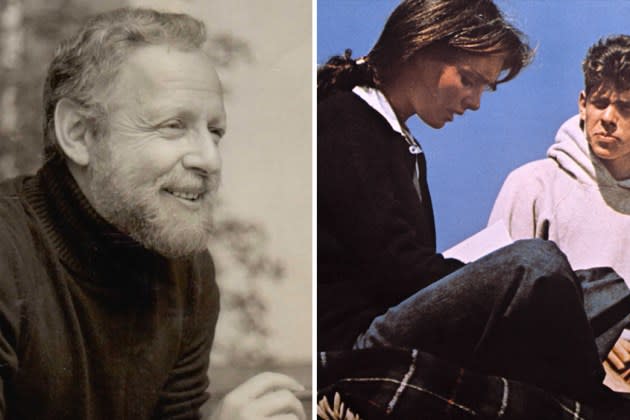Herman Raucher Dies: Oscar-Nominated ‘Summer Of ’42’ Screenwriter Was 95
- Oops!Something went wrong.Please try again later.
- Oops!Something went wrong.Please try again later.

Herman Raucher, whose Oscar-nominated Summer of ’42 screenplay became one of Hollywood’s best-loved coming-of-age tales, has died of natural causes at Stamford Hospital in Stamford, CT. He was 95.
His December 28 death was announced by daughter Jenny Raucher, who was by his side when he passed.
More from Deadline
Hollywood & Media Deaths In 2023: Photo Gallery & Obituaries
Hollywood & Media Deaths In 2024: Photo Gallery & Obituaries
Hy Levine Dies: Print And Outdoor Advertising Executive Behind Studio Film Blockbusters Was 87
Subsequently adapted by Raucher into an international best-selling novel, 1971’s Summer of ’42 was nominated for four Academy Awards including Best Original Screenplay. It told the nostalgic and bittersweet story of teenager Hermie — played by Gary Grimes and based on Raucher himself — who, during a summertime vacation on Nantucket Island, becomes infatuated with a beautiful (and soon grieving) older woman (Jennifer O’Neill) whose husband has gone off to fight in World War II.
The film, directed by Robert Mulligan (To Kill a Mockingbird), was a critical success and a major hit for Warner Bros. Michel Legrand’s score won an Oscar and quickly became one of the most recognizable movie themes of the decade.
Born on April 13, 1928, in Brooklyn, Raucher got his start in show business writing for such Golden Age TV dramas as Studio One, Goodyear Playhouse and The Alcoa Hour. At the same time, he served as Advertising Copy Director for Walt Disney, whose new company, Buena Vista, was expanding from animated films into live-action productions. Raucher continued as Creative Director and board member of several major New York advertising agencies before leaving the ad world to focus on his own writing.
Prior to Summer of ’42, Raucher wrote the screenplay for the 1969 cult film Can Heironymus Merkin Ever Forget Mercy Humppe and Find True Happiness?, co-written by and starring Anthony Newley, who the previous year had co-starred with Sandy Dennis in Raucher’s Sweet November.
In 1970, Raucher wrote the screenplay for the groundbreaking film Watermelon Man, a racially-charged satire about a racist white man who wakes up one morning to discover he has become a Black man. The film was directed by Melvin Van Peebles and starred Godfrey Cambridge in the lead role along with with Estelle Parsons, who recently had won an Oscar for her supporting performance in Bonnie and Clyde.
RELATED: Melvin Van Peebles Dies: Godfather Of Black Cinema Behind ‘Sweet Sweetback’s Baadasssss Song’, ‘Watermelon Man‘ & More Was 89
Raucher went on to pen screenplays for other popular films — Ode to Billy Joe in 1976, The Other Side of Midnight in 1977 and, in an uncredited, script-doctoring role, 1979’s The Great Santini — but Summer of ’42 would remain his signature work. The original screenplay came from a heartbreaking source: the death in the Korean War of his best friend Oscy Seltzer, who became a central character in both the movie and novel (played by Jerry Houser in the film).
Seltzer was killed on April 13, 1952, an event that, according to Raucher’s daughter Jenny, left Raucher with a lifelong difficulty celebrating his own birthday.
Raucher wrote a sequel to the film in 1973 — Class of ’44, reuniting Grime, Houser and Oliver Conant from the original — but it failed to recapture the first film’s success, either critically or commercially. The sequel is perhaps most noted today for a brief, uncredited appearance by a youthful John Candy.
Among those counted as fans of both movies is Quentin Tarantino, who last year said on a podcast, “I think Summer of ’42 is actually one of the best movies of the ’70s and one of the most devastating endings of any movie I’ve ever seen. It’s just a great movie. I’m a big fan of the sequel, too, The Class of ’44.“
Summer of ’42 also was adapted as an Off Broadway musical in 2001, but despite his film and stage endeavors, Raucher “felt most at home with novels — the one medium in which no one could change as much as a comma without his approval — a condition to which every writer aspires but very few achieve,” according to his family. In addition to the best-selling Summer of ’42, Raucher’s books include A Glimpse of Tiger, There Should Have Been Castles and Maynard’s House. In recent years, the novels have been re-issued, along with new foreign editions and audiobooks.
Raucher was predeceased by his wife of 42 years, Mary Kathryn Raucher, a student of the School of American Ballet with George Balanchine and also a dancer on Broadway, who died in 2002. In addition to Jenny Raucher, he is survived by daughter Jacqueline Raucher-Salkin, her husband William Salkin, and granddaughters Samantha Salkin and Jamie Salkin.
In lieu of flowers, the family requests donations in Herman Raucher’s name to the Michael J. Fox Foundation at give.michaeljfox.org.
Best of Deadline
Hollywood & Media Deaths In 2024: Photo Gallery & Obituaries
2024 Premiere Dates For New & Returning Series On Broadcast, Cable & Streaming
Hollywood & Media Deaths In 2023: Photo Gallery & Obituaries
Sign up for Deadline's Newsletter. For the latest news, follow us on Facebook, Twitter, and Instagram.

